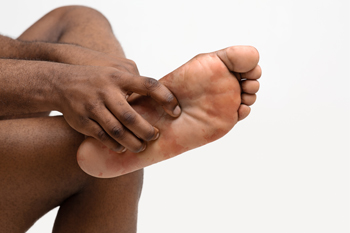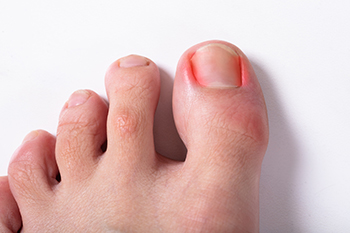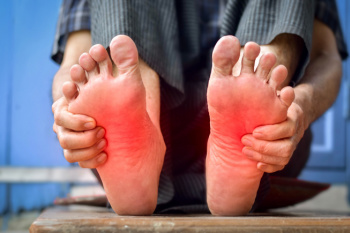March 2024
Arthritis Can Cause Pain in the Feet and Ankles
Symptoms and Origin of Achilles Tendon Injuries

Achilles tendon injuries represent a common ailment affecting individuals engaged in physical activities, particularly athletes. The Achilles tendon is a robust band of tissue connecting the calf muscles to the heel bone. This tendon facilitates essential movements such as walking, running, and jumping. Symptoms of Achilles tendon injuries typically include pain and stiffness at the back of the heel, aggravated during physical exertion or when climbing stairs. Swelling and tenderness along the tendon often accompany these symptoms, indicating potential damage. The name Achilles tendon injury originates from the legendary Greek hero Achilles, who was known for his invincibility in battle except for his heel, which was his lone vulnerable spot. This historical reference underscores the vulnerability of the Achilles tendon to injury, emphasizing the significance of its proper care and treatment. Understanding the definition, symptoms, and origin of Achilles tendon injuries empowers individuals to recognize and address these issues promptly, promoting optimal recovery and prevention strategies. If you have endured this type of injury, it is suggested that you promptly consult a podiatrist who can accurately diagnose and treat this condition.
Achilles tendon injuries need immediate attention to avoid future complications. If you have any concerns, contact Dr. Robert Marcus of Foot & Ankle Center of Teaneck. Our doctor can provide the care you need to keep you pain-free and on your feet.
What Is the Achilles Tendon?
The Achilles tendon is a tendon that connects the lower leg muscles and calf to the heel of the foot. It is the strongest tendon in the human body and is essential for making movement possible. Because this tendon is such an integral part of the body, any injuries to it can create immense difficulties and should immediately be presented to a doctor.
What Are the Symptoms of an Achilles Tendon Injury?
There are various types of injuries that can affect the Achilles tendon. The two most common injuries are Achilles tendinitis and ruptures of the tendon.
Achilles Tendinitis Symptoms
- Inflammation
- Dull to severe pain
- Increased blood flow to the tendon
- Thickening of the tendon
Rupture Symptoms
- Extreme pain and swelling in the foot
- Total immobility
Treatment and Prevention
Achilles tendon injuries are diagnosed by a thorough physical evaluation, which can include an MRI. Treatment involves rest, physical therapy, and in some cases, surgery. However, various preventative measures can be taken to avoid these injuries, such as:
- Thorough stretching of the tendon before and after exercise
- Strengthening exercises like calf raises, squats, leg curls, leg extensions, leg raises, lunges, and leg presses
If you have any questions please feel free to contact our office located in Teaneck, NJ . We offer the newest diagnostic tools and technology to treat your foot and ankle needs.
Causes for Foot Nerve Pain

Foot nerve pain can arise from various conditions, each with its own symptoms and contributing factors. Morton's neuroma, a common cause of foot discomfort, involves the thickening of tissue around the nerves leading to the toes, resulting in sharp, burning pain, particularly between the third and fourth toes. Baxter's neuropathy, also known as entrapment of the first branch of the lateral plantar nerve, occurs when the nerve becomes compressed, leading to tingling, numbness, or shooting pain in the heel or arch of the foot. Tarsal tunnel syndrome, akin to carpal tunnel syndrome in the wrist, involves compression of the posterior tibial nerve as it passes through the tarsal tunnel, causing pain, burning, or tingling sensations in the ankle and foot. These conditions can be triggered by various factors, including repetitive stress, wearing improper footwear, foot deformities, or underlying medical conditions. For help managing foot nerve pain, it is suggested that you make an appointment with a podiatrist.
Foot Pain
Foot pain can be extremely painful and debilitating. If you have a foot pain, consult with Dr. Robert Marcus from Foot & Ankle Center of Teaneck. Our doctor will assess your condition and provide you with quality foot and ankle treatment.
Causes
Foot pain is a very broad condition that could be caused by one or more ailments. The most common include:
- Bunions
- Hammertoes
- Plantar Fasciitis
- Bone Spurs
- Corns
- Tarsal Tunnel Syndrome
- Ingrown Toenails
- Arthritis (such as Gout, Rheumatoid, and Osteoarthritis)
- Flat Feet
- Injury (from stress fractures, broken toe, foot, ankle, Achilles tendon ruptures, and sprains)
- And more
Diagnosis
To figure out the cause of foot pain, podiatrists utilize several different methods. This can range from simple visual inspections and sensation tests to X-rays and MRI scans. Prior medical history, family medical history, and any recent physical traumatic events will all be taken into consideration for a proper diagnosis.
Treatment
Treatment depends upon the cause of the foot pain. Whether it is resting, staying off the foot, or having surgery; podiatrists have a number of treatment options available for foot pain.
If you have any questions, please feel free to contact our office located in Teaneck, NJ . We offer the newest diagnostic and treatment technologies for all your foot care needs.
A Podiatrist’s Approach to Ingrown Toenails
 When you have an ingrown toenail, it means that the edge of the nail is growing into the skin around it. A podiatrist, who is a foot doctor, has several approaches to treatment, which can range from conservative to surgical. A podiatrist may perform a nail-lifting procedure by using cotton or gauze to separate the nail edge from the skin. If the ingrown toenail keeps coming back or is severe, a podiatrist can also perform a small surgery. This usually involves removing a part of the nail and sometimes a bit of the skin around it to stop the nail from growing into the skin again. The podiatrist can make sure you're comfortable during the procedure by using local anesthetics. If you’re suffering from an ingrown toenail, it is suggested that you seek treatment with a podiatrist, who can both treat your toe and give you advice on how to prevent the problem from coming back.
When you have an ingrown toenail, it means that the edge of the nail is growing into the skin around it. A podiatrist, who is a foot doctor, has several approaches to treatment, which can range from conservative to surgical. A podiatrist may perform a nail-lifting procedure by using cotton or gauze to separate the nail edge from the skin. If the ingrown toenail keeps coming back or is severe, a podiatrist can also perform a small surgery. This usually involves removing a part of the nail and sometimes a bit of the skin around it to stop the nail from growing into the skin again. The podiatrist can make sure you're comfortable during the procedure by using local anesthetics. If you’re suffering from an ingrown toenail, it is suggested that you seek treatment with a podiatrist, who can both treat your toe and give you advice on how to prevent the problem from coming back.
Ingrown toenails can become painful if they are not treated properly. For more information about ingrown toenails, contact Dr. Robert Marcus of Foot & Ankle Center of Teaneck. Our doctor can provide the care you need to keep you pain-free and on your feet.
Ingrown Toenails
Ingrown toenails occur when a toenail grows sideways into the bed of the nail, causing pain, swelling, and possibly infection.
Causes
- Bacterial infections
- Improper nail cutting such as cutting it too short or not straight across
- Trauma to the toe, such as stubbing, which causes the nail to grow back irregularly
- Ill-fitting shoes that bunch the toes too close together
- Genetic predisposition
Prevention
Because ingrown toenails are not something found outside of shoe-wearing cultures, going barefoot as often as possible will decrease the likeliness of developing ingrown toenails. Wearing proper fitting shoes and using proper cutting techniques will also help decrease your risk of developing ingrown toenails.
Treatment
Ingrown toenails are a very treatable foot condition. In minor cases, soaking the affected area in salt or antibacterial soaps will not only help with the ingrown nail itself, but also help prevent any infections from occurring. In more severe cases, surgery is an option. In either case, speaking to your podiatrist about this condition will help you get a better understanding of specific treatment options that are right for you.
If you have any questions please feel free to contact our office located in Teaneck, NJ . We offer the newest diagnostic and treatment technologies for all your foot and ankle needs.
Exercises That Can Help Relieve Foot Arthritis

Foot arthritis can significantly impact mobility and quality of life, but incorporating targeted exercises into your daily routine can help alleviate discomfort and improve joint function. Toe curls, where you scrunch a towel or small object with your toes, can strengthen the muscles in your feet and toes, providing better support for arthritic joints. Ankle circles involve gently rotating your ankles in clockwise and counterclockwise motions to improve flexibility and reduce stiffness. Additionally, seated calf stretches and toe stretches can help improve range of motion and reduce tension in the foot and ankle joints. Walking in a swimming pool or performing water aerobics can provide low-impact exercise, while reducing stress on arthritic joints. Incorporating some of these exercises into your routine can help manage foot arthritis symptoms. If you have arthritis and your feet are affected, it is strongly suggested that you are under the care of a podiatrist who can help you to manage this condition.
Arthritis can be a difficult condition to live with. If you are seeking treatment, contact Dr. Robert Marcus from Foot & Ankle Center of Teaneck. Our doctor can provide the care you need to keep you pain-free and on your feet.
Arthritic Foot Care
Arthritis is a term that is commonly used to describe joint pain. The condition itself can occur to anyone of any age, race, or gender, and there are over 100 types of it. Nevertheless, arthritis is more commonly found in women compared to men, and it is also more prevalent in those who are overweight. The causes of arthritis vary depending on which type of arthritis you have. Osteoarthritis for example, is often caused by injury, while rheumatoid arthritis is caused by a misdirected immune system.
Symptoms
- Swelling
- Pain
- Stiffness
- Decreased Range of Motion
Arthritic symptoms range in severity, and they may come and go. Some symptoms stay the same for several years but could potentially get worse with time. Severe cases of arthritis can prevent its sufferers from performing daily activities and make walking difficult.
Risk Factors
- Occupation – Occupations requiring repetitive knee movements have been linked to osteoarthritis
- Obesity – Excess weight can contribute to osteoarthritis development
- Infection – Microbial agents can infect the joints and trigger arthritis
- Joint Injuries – Damage to joints may lead to osteoarthritis
- Age – Risk increases with age
- Gender –Most types are more common in women
- Genetics – Arthritis can be hereditary
If you suspect your arthritis is affecting your feet, it is crucial that you see a podiatrist immediately. Your doctor will be able to address your specific case and help you decide which treatment method is best for you.
If you have any questions, please feel free to contact our office located in Teaneck, NJ . We offer the newest diagnostic and treatment technologies for all your foot care needs.







